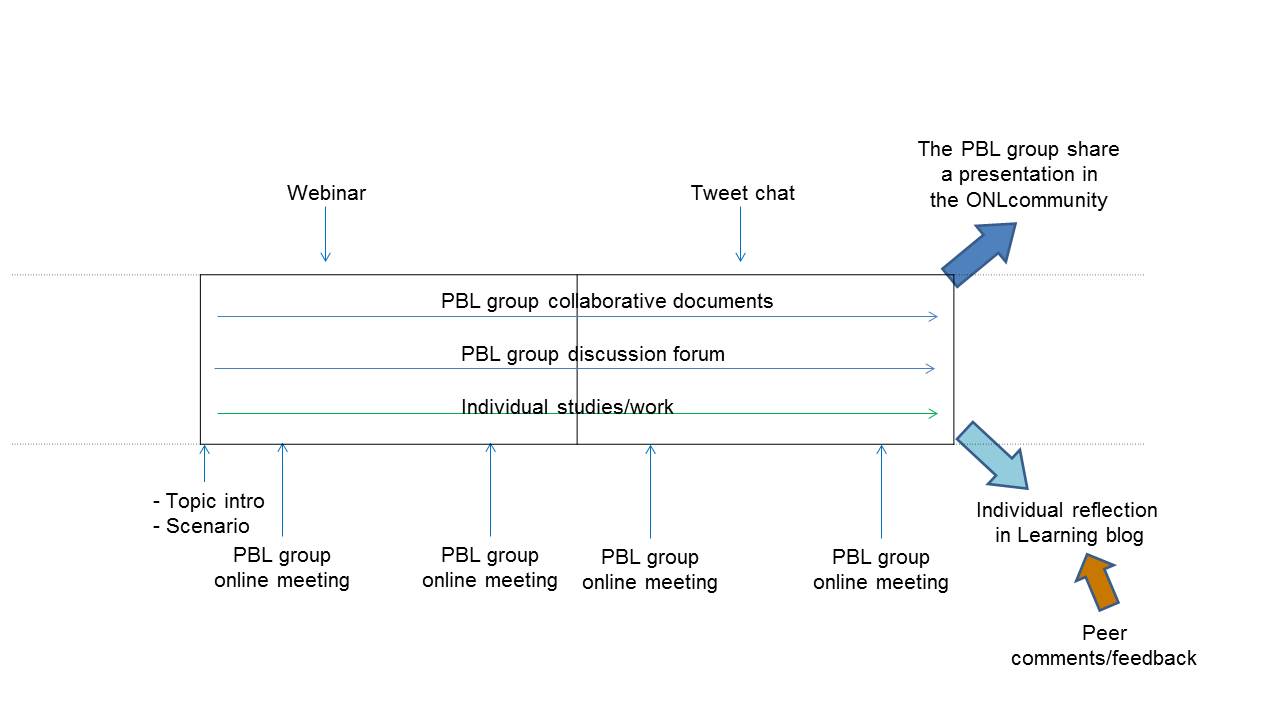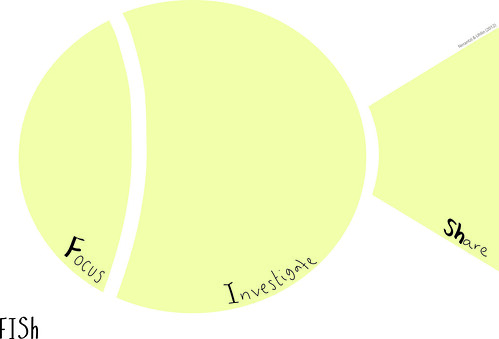| ONL learning activities will involve inquiry into your own practice, scenarios and engagement in related discussion, shared reflection and learning through doing. You are in the driving seat of your learning and will need to define your intended learning outcomes and plan for learning for each topic, by yourself or within a group depending on the mode of participation.
For each topic there will be an authentic scenario or choice of scenarios for you and your group to investigate. To guide your process of inquiry consider to use the FISh model (see below) which provides a structure for collaborative inquiry.
Reflect on your learning
In the ONL course an important part of the learning process is to reflect on the things you are experiencing and how you understand it. This is an on-going activity during the course and you should write down your thoughts and present them after each topic. In the instructions for each topic you will be presented with reflective tasks as a help for this activity.
By reflecting you will understand yourself and your learning better. There are several things that you can look at: for example your understanding of the material, how well you understand certain concepts, how presented ideas could work in your own context etc. You can also look at your own practice and see how you can apply these new ideas or make a comparison. By looking critically about how you learn, you will also develop your metacognitive skills.
To share what you have learnt with your peers you can use a visual journal, field diary or create a individual reflection space. The reflections can be presented in the form of a text, a video, an audio file etc. We encourage you to continuously write down your thoughts, ideas and reflections from your learning experience, as you go through the course.
Many of our participants have shared their reflections openly. We encourage you also to connect your reflection space to the course homepage. By doing so, your posts will be shared with the ONL community and you can get input and feedback from other course participants, the course team and the international community of practitioners.
Webinars
We arrange several webinars during the course, mainly using the platform Zoom. They normally take one hour and you simply log in just before the start. All webinars are open to anyone with the link and sometimes we get external participants. We aim to make these as interactive as possible so be prepared to contribute, mostly by chat but even with audio and video (requires webcam and headset). Full instructions for each webinar will be posted in the course community and on the course overview under each topic as we go along. The webinars are usually recorded and the recordings are made available in the course overview page as well as in the discussion forum. In Zoom the chat does not appear in the recordings and the names of the participants are not visible. If you do not want to be visible in the webinar you can choose not to activate your camera.
Tweetchats
During the course we might conduct a tweetchat where we will discuss aspects of the current topic. A tweetchat is a discussion using Twitter where we meet for one hour and where you answer the questions set by the discussion moderator. By using a common hashtag (#ONL232) all contributions to the discussion can be seen in one common feed and the discussion develops as more people contribute. You can choose to participate using your own Twitter account or you can simply follow the discussion passively by going to https://twitter.com/ and entering #ONL232 in the search function. Full instructions for tweetchats will be posted in the course community and on the main course site.
Introduction to Twitter
Taking part in a tweetchat
PBL groups
Participation in a PBL group is an essential part of the ONL experience and most of the course activities take place within these groups. Each iteration will have PBL groups with 7-8 members in each who will work asynchronously and synchronously during the course with support from a facilitator and a co-facilitator. Each PBL group has its own community for discussion and a Google drive folder for collaborative documents as well as an e-meeting room. Guidelines and templates to start up their work will be provided in each group.
Below you can see an example structure for studies in a PBL group during a two week topic.

PBL group facilitator and co-facilitator
Each group has a facilitator from one of the organising institutions and a co-facilitator who has recently completed the course as a participant. The facilitator will be there to support individual participants and groups. The facilitators might be more hands-on at the beginning to help you coordinate the initial activities so that you can get started. Progressively, the facilitators will step back and let individuals and groups decide when they need her/his help. If you need help, please let the facilitators know via the ONL community. To read more about their roles view Facilitation in ONL.
FISh – a model for individual, pair and PBL group inquiry
Within the framework of a Problem-Based Learning approach a simplified model for inquiry, called FISh, has been developed (Nerantzi and Uhlin, 2012). We suggest the use of FISh when working collaboratively with inquiry into scenarios in each topic. Even if you learn autonomously or with a learning buddy, FISh might help you as a structure for your learning process. However, remember that learning is messy and following or restricting yourself to a linear process might not work and can be frustrating at times.
 The FISh model has been developed by Chrissi Nerantzi & Lars Uhlin (2012), image designed by artist Ellie Livermore. The FISh model has been developed by Chrissi Nerantzi & Lars Uhlin (2012), image designed by artist Ellie Livermore.
Step 1: Focus
- What do I/we see?
- How do I/we understand what we see?
- What do I/we need to find out more about?
- Specify learning issues/intended learning outcomes!
Step 2: Investigate
- How and where am I/are we going to find answers?
- What will I do/who will do what and by when?
- What main findings and solutions do I/we propose?
Step 3: Share
- How am I/are we going to present my/our findings?
- What do I/we want to share with the community?
- How can I/we provide feedback to others?
- What reflections do I have about my learning (and working with others)?
|